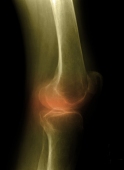
THURSDAY, Sept. 16 (HealthDay News) — Although millions take supplements containing glucosamine and chondroitin to relieve the pain of osteoarthritis in their hips and knees, there is no evidence that these supplements have any healing effect, finds a new analysis of large-scale studies.
This latest report is one of several that have found no beneficial effect of either supplement in relieving arthritic pain. But since there is no evidence that the pills cause harm, the new report’s authors say there’s no reason to stop taking them if individuals think they are being helped.
On the other hand, “if a patient hasn’t had these preparations [already], it doesn’t make sense that he or she should be encouraged to take these supplements,” said lead researcher Dr. Peter Juni, head of the division of Clinical Epidemiology and Biostatistics at the Institute of Social and Preventive Medicine at the University of Bern in Switzerland.
The bottom line, according to Juni: “None of the two supplements we evaluated appears to have any clinically relevant benefit in terms of pain relief that could be detected by patients with knee or hip arthritis.”
The report is published in the Sept. 17 online edition of the BMJ.
Over the past 10 years doctors have prescribed supplemental glucosamine and chondroitin and many millions around the world have bought them over-the-counter, the researchers said.
According to background information in the study, in 2008 sales of glucosamine supplements around the world reached almost $2 billion — about a 60 percent increase since 2003.
For the new study, Juni’s team analyzed the results of 10 randomized clinical trials involving more than 3,800 patients with knee or hip osteoarthritis. The trials — which all compared people taking the supplements to a control group that was not taking them — focused on any changes in levels of pain after patients took glucosamine, chondroitin or both, comparing them with the placebo or with each other.
Poring through all the data, the researchers found no clinically relevant effect of chondroitin, glucosamine or both taken together on joint pain or on narrowing the space within the painful joints.
Commenting on the study, Dr. Andrew Sherman, associate professor and vice-chair, department of rehabilitation medicine at the University of Miami Leonard M. Miller School of Medicine, said that “we need to look more closely at these over-the-counter medications that claim to be panaceas and may not be giving us our money’s worth.”
For his part, Juni said that, “if the patient already has had the preparations and really believes in a benefit — which is most likely related to the natural history of the disease or to a placebo effect — in light of the fact that we don’t have any evidence that these preparations are unsafe, there is no real reason to actively discourage these patients from taking these preparations as long as they can cover the cost.”
Sherman agreed that some people report these supplements help them.
“Is it that they want it to help so bad or so much that they actually feel better, and that’s a placebo effect? Or is it able to help a small minority of folks, just not a majority of people?” he said.
Since there appears to be no negative consequence to taking these supplements (except cost) there appears to be no harm in doing so, Sherman said.
The study does suggest, however, that the claims that the companies who produce the supplements are making “need to be reevaluated, scrutinized and criticized until such time as a large study shows that the medication works,” Sherman said. “At this time no such study exists.”
More information
For more information on arthritis, visit the U.S. National Library of Medicine.

